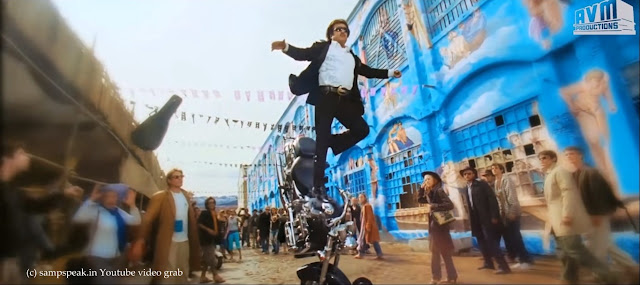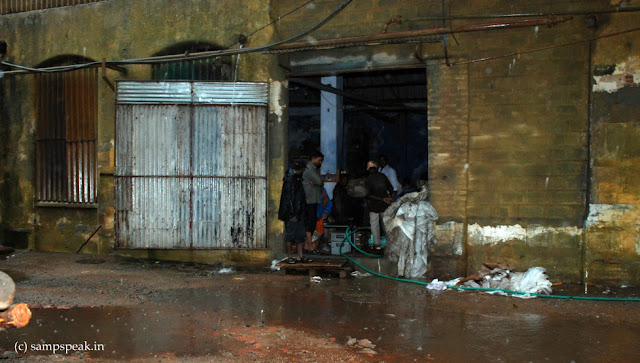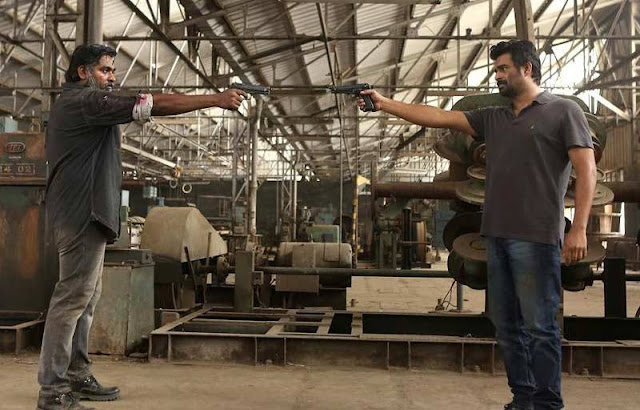1983 changed the face of Indian Cricket – at Berbice with a thundering knock by Kapil Dev, India beat WI in an One dayer. The won 6 of their matches winning the 1983 Prudential Cup. Do you remember that match ODI no. 219 - 23rd Match of WC played at Chelmsford, Jun 20 1983, when India comfortably beat Australia !!
.. .. அடி பில்லா ரங்கா பாஷாதான் –இவன் பிஸ்டல் பேசும் பேஷாதான் !
பாஞ்சா சாஞ்சா... காஞ்சா மேஞ்சா... தோஞ்சா மாஞ்சா..! (immortal Tamil song)

In my school days – when we went to buy school uniform at the ‘Popular Stores’ in Pycrofts Road – we had the option of buying cheap unnamed cloth (which most of us bought) or the premier Binny Mills textiles !! - that was in 1970s
In late 1980s – had visited Binny Office at Armenian Street – they were our valued client of Oriental Insurance – remember buying Deepavali dress of Binny Mills !

Around 2005, during Chennai floods – recall visiting Binny Mills compound – it was ‘transporter’s godown’ as also some individual godown. Our claimant was a dealer in paper / paper boards which were inundated – a Competitor insurer was dealing with a very lodge claim arising out flood water entering the godown and damaging the goods there. By that time, the Textile mill had declined – done in by industrial strikes and losses – the vast premises was no longer a manufacturing unit but was more of a godown and .. .. .. a place for Cinema shooting.
Did you see – ‘Sivaji, the Boss’ – Rajnikant starrer – a key portion of the movie including the song "Athiradi" were filmed at Binny Mills. The sets for the song were made bearing resemblance to the city of Venice. Vikram Vedha climax too was shot here .. .. it ends here, for this is no cinema post !!

Exactly a century ago – there was a strike by the workers of Buckingham and Carnatic Mills in the city of Madras, against the managing company, Binny and Co. The strike, which lasted from June to October 1921, caused severe losses to the Madras economy. It also created a rift in the ruling Justice Party forcing many Dalit leaders to leave.
Buckingham and Carnatic Mills, popularly known as B & C Mills, were textile mills run by Binny and Co. in the city of Chennai, India. The mills were closed down in 1996 and the site is now used as a container freight station and is a popular venue for film shootings. In the expansive area mill produced textiles that reached stores across the country has been closed since 1996, but the news that Binny Ltd is being split into three entities is reason enough to look back at the history of a company that sparked industrialisation in Madras as well as organised trade unionism in the country.
John ‘Deaf’ Binny, who arrived in India in 1797 to work for the Nawab of Carnatic, established Binny & Dennison (with Robert Dennison) in 1799. The firm, with its headquarters on Armenian Street, was an agency house representing British interests in south India, says historian S Muthiah. Binny & Dennison became Binny & Co in 1812, and by 1870 the Buckingham and Carnatic Mills was set up in Perambur, the first major industrial center in the south. Agricultural labourers, weavers and artisans from the area joined the factory, according to ‘Madras - The Land, The People and Their Governance’. They found that the working day stretched to 18 hours, there were differences in wages and they had no facilities for food and rest. The workers went on strike in June 1873. By April 1918, they had organised themselves as the Madras Workers’ Union, the first organised trade union in the country.
“There had been workers’ struggles in the country from 1914, but this was the first trade union with bylaws, rules and regulations. It was perhaps the beginning of trade unionism in India.” Binny’s eventually grew into one of the biggest business houses in India, expanding into cotton, spinning, weaving and other activities, but it was not modernized enough as it failed to compete and eternally closed down with heavy accumulated losses, strikes, lay-offs and more.
In 1980s the Communist unions were in the forefront in the strikes, as labor dogged the Company, it was sold off. In the 1990s, the Udayar group bought it, primarily for real estate. The mills were finally shut down in 1996, after more labor unrest. Part of the mill property in Perambur is now set to become an integrated township. The original founder, John Binny, is still remembered by a short stretch of road, Binny Road, in front of Taj Connemara, the property he owned in the 1800s.
Sad ending for ‘Binny & Co’ one of the biggest Private enterprises that was set up in Perambur / Basin Bridge in 1876 and later merged with Carnatic Mills set up in 1881. It is stated that India's first labor union, the Madras Labour Union (MLU) was formed at Buckingham and Carnatic Mills by B. P. Wadia and V. Kalyanasundaram Mudaliar on 27 April 1918. Early union activity took place in the Buckingham and Carnatic Mills during October–December 1920 when workers struck in protest against working conditions. The government responded by ordering the police to shoot down striking workers on 9 December 1920 to bring the strike to a forceful end. There was widespread unrest among the workers over the low wages and poor working conditions. Their demands were supported by Indian nationalists Indian National Congress as well as the pro-British Justice Party.
On 20 May 1921, the workers in the Spinning Department of the Buckingham and Carnatic Mills refused to work until the management agreed to discuss their wage rise demands. The protest reached serious proportions when an official strike was declared on 20 June. The striking workers were led by Congressman V. Kalyanasundaram Mudaliar. The Indian National Congress convened a meeting in Madras on 10 July 1921; in this meeting, C. Rajagopalachari moved for a resolution sympathizing with the workers of the Buckingham and Carnatic Mills and supporting their cause. The strike lasted for a total of six months. The authorities adopted a ruthless policy to suppress the agitation. On 29 August 1921, the police opened fire, killing six workers.
In the aftermath of the strike, the major political factions in the Madras Presidency began leveling charges against one another. The Indian National Congress blamed the government for the ruthless suppression of labor activities, while the Justice Party blamed the Non-Cooperation Movement for causing the unrest and criticized the government for showing partiality. The Madras government appointed a three-member enquiry committee headed by Sir William Ayling to investigate the causes of the strike.
At Chelmsford – it was the last of the group matches – India had won 3, Australia had won only 2 – but a loss to Australia could have spoilt India’s chances. India batting first made 247 in 55 overs. Yashpal Sharma was the topscorer with 40; next was Extras with 37 . David Hookes led Aussies, Dennis Lillee was dropped ! .. .. Kapil Dev brough Roger Binny early – and Binny had magical figures of 8-2-29-4; Madanlal had it even better 8.2-3-20-4. Roger Binny was the Man of the match [Roger Binny nor Stuart Binny have nothing to do with Binny Mills !]
With regards – S. Sampathkumar21st June 2021.

